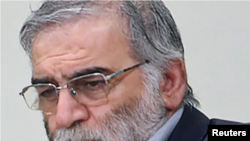Iran’s supreme leader is seeking retribution for the assassination of the country’s top nuclear scientist.
On Saturday, Ayatollah Ali Khamenei called for the “definitive punishment” for whoever is responsible for the death of Mohsen Fakhrizadeh.
Friday’s assassination of Fakhrizadeh, the second senior Iranian military figure to be killed this year, has highlighted Tehran’s weakness in protecting key officials and its adversaries’ skill at eliminating them, some analysts say.
Iran said Fakhrizadeh, 59, was killed in an armed, daylight attack on a vehicle in which he was traveling in the northern town of Absard, about 90 kilometers east of the capital, Tehran.
There was no immediate claim of responsibility for the killing of Fakhrizadeh, who headed the Iranian defense ministry’s Organization of Defensive Innovation and Research, known by its Persian acronym SPND. He previously had led a covert nuclear weapons program that Iran launched in the late 1980s and ostensibly abandoned in 2003, according to the U.N. nuclear agency, the International Atomic Energy Agency.
Iranian President Hassan Rouhani has blamed Israel for the scientist’s death.
"Once again, the evil hands of Global Arrogance and the Zionist mercenaries were stained with the blood of an Iranian son," Rouhani said in a televised cabinet meeting, using references associated with the United States and Israel.
Fakhrizadeh’s assassination came almost 11 months after a U.S. airstrike killed Iran’s top military commander, Qassem Soleimani, in Baghdad on January 3. Washington called that strike a defensive operation to protect U.S. personnel abroad from Soleimani, who led Iran’s Islamic Revolutionary Guard Corps-Quds Force, a U.S.-designated foreign terrorist organization.
Speaking to VOA Persian, Middle East security specialist Thomas Juneau, a University of Ottawa professor, said the assassinations of Fakhrizadeh and Soleimani represent serious security failures by the Iranian leadership.
“You have to assume that both men were under very serious protection by the Iranian regime,” Juneau said.
He said the assassinations also highlight the relative strengths of Iran’s adversaries.
"Whoever was responsible for killing Fakhrizadeh, they exercised a high degree of skill by carrying out the operation in the suburbs of the capital during daylight and on the street while he was presumably under protection,” Juneau said. “As for Soleimani’s killing, it was a result of the U.S. devoting tremendous amounts of energy and resources to follow him and listen in on his conversations to know what he was up to.”
Islamist-ruled Iran, which denies ever seeking nuclear weapons, blamed Fakhrizadeh’s killing on its regional foe Israel and threatened harsh retaliation.
Israel, whose destruction Tehran has long advocated, made no comment. The Jewish state and its main ally, the United States, have refused to rule out military action to prevent Iran from becoming nuclear-armed.
Fifth assassination
Fakhrizadeh is the fifth Iranian nuclear expert to be assassinated in the past decade. A series of bombing and shooting attacks that Iran also blamed on Israel killed two experts in 2010, a third in 2011 and a fourth in 2012. Israel similarly neither confirmed nor denied a role in those killings.
Eric Brewer, a nuclear analyst at the Center for Strategic and International Studies, told VOA that Iran does not have a good track record in protecting its nuclear scientists.
He also noted Iran’s inability to stop an Israeli operation that stole nuclear archives from an Iranian warehouse in early 2018. Iran challenged the authenticity of the stolen material, but U.S. intelligence officials reviewed it and believed it to be genuine.
Israel said the archives showed Fakhrizadeh and SPND had continued covert work on nuclear weapons in recent years.
“From the perspective of Iran and the scientists, they have got to be worried about the secrecy of their efforts and their ability to protect that type of work,” Brewer said.
Suzanne Maloney, foreign policy director at the Brookings Institution, tweeted that Friday’s assassination casts more doubt on Iran’s security capabilities.
“What does it say about Tehran's much-vaunted security forces and apparent bid for regional hegemony when they are repeatedly unable to prevent agents of their foremost adversary from penetrating the capital and seizing warehouses full of sensitive intel or assassinating key officials?” she wrote.
In a tweeted response to Maloney, Alex Vatanka, Iran program director at the Middle East Institute, said Iran “always talks a bigger game than it can deliver.”
“And just imagine the pool of potential regime insiders ready to work on behalf of foreign powers. At this rate, no one in the Iranian Islamist regime is secure from assassination,” Vatanka wrote.
This article originated in VOA’s Persian Service.





